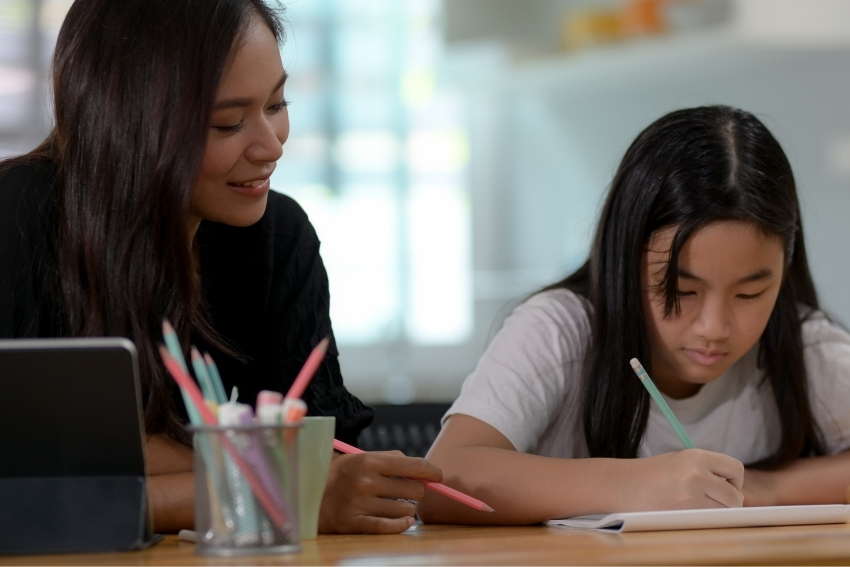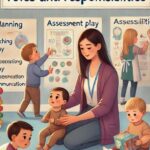What are GCSEs and KS4?
Key Stage 4 is a term that refers to the two years of school education in England (known as Years 10 and 11) when students are between 14–16. It incorporates examinations such as GCSE and KS4 vocational qualifications.
GCSEs are common UK qualifications at the end of secondary school. They are needed to get into a university and even some jobs require them. Since AS levels no longer count toward a final A-level grade, GCSEs became even more important. Nevertheless, getting a bad grade or failing GCSEs is not the end of the world. Students can retake exams whenever they want to. There are no prerequisites or age restrictions.
The GCSE grading system changed from letters to numbers a few years ago. They are graded 1-9, with 9 being the highest grade you can get, 4 being a “standard pass” and 5 being a “strong pass”. However, some universities have their own entry requirements. GCSEs are split into core subjects and optional subjects. Mandatory subjects include English, maths and science. Other than that, students are free to choose as many other GCSE subjects as they’d wish. Typically they choose an average of 9 subjects.
What are Vocational Qualifications?
Vocational qualifications are work-related qualifications that can be studied at Key Stage 4. However, Vocational Qualifications (VQs) can be taken at any stage of your life and don’t require any prior knowledge. They prepare KS4 students for employment and are different from GCSEs, which at Key Stage 4 focus on your future academic achievements.
Academic qualifications are based on the traditional classroom learning of a wide variety of subjects and do not necessarily boost your career development. Many students are applying for university with a combination of A-level and vocational qualifications. The points you get from BTECs still count towards your UCAS application.
The purpose of vocational education is to enable learners to acquire the knowledge and skills required by national occupational standards (NOS) in order to perform a particular job. Once the programme is completed, a vocational qualification provides proof to employers that the learner has been adequately trained for a particular workplace.
Vocational qualifications range from entry-level through level 7, which are very similar to other qualification levels.
Here are the rough equivalents provided by Amber Rolfe:

GCSE and KS4 Vocational Grades Data 2022 Explained
During the covid-19 pandemic, GCSEs, vocational qualifications and some other exams were assessed without students attending the exam. This resulted in overall grades being higher in 2020 and 2021. That’s why experts don’t recommend comparing 2022 GCSE grades to the previous two years.
The percentage of achieving a “strong pass” – grade 5 is 2.3 points lower in 2022 than it was in 2021 according to Education Hub. And the attainment score (average academic performance of secondary school students) decreased by 2.2 points after 2021 but increased by 2.0 points after 2019.
The University College London has published an article that analyses NRT grades in English and Maths over the years. NRT stands for national reference test that is taken by students a few months before GCSEs. This test is designed to provide data on student ability in a specific year as well as evidence of how performance has changed over time. Even though there is a slight decline in grades compared to 2019, it’s not drastic. However, there is no question that the pandemic had a huge effect on students and their education.
How Can We Narrow the Attainment Gap?

The educational achievement gap in the UK is a widespread concern. “Attainment” refers to the level of educational achievement and this problem affects all students. Possible causes of the gap include decreased mental health and difficulty in concentrating.
✏️ “As the UK looks back on a full year of COVID-19-related lockdowns and restrictions, many may find that their attention span has diminished, or that they are struggling to focus or concentrate on the smallest things,” – explains psychologist and co-founder of mental health and self-development platform Remente, Niels Eék.
GCSE and Vocational Grade Predictions 2023
It is expected that overall results in 2023 will be much closer to pre-pandemic years than results since 2020. We expect this decision means that the grades of students may decline next year, although we don’t know yet how these changes might impact specific subjects and specifications.
How Can Parents Help?
Parents can provide their children with emotional support, and encourage them to go outside and adopt healthy habits.
If children can’t focus on their homework or studies consistently and parents have tried everything they know to help, it may be time for additional help. It depends on what kind of issue the child has. If the problem comes from mental health issues, it’s better to hire a mental health professional.
On the other hand, a tutor might greatly benefit a child who requires a slight improvement in their academic performance.
There are many types of tutoring available, from quick one-off sessions to in-depth immersion programs. However, some parents feel hesitant about signing their kids up for long commitments when they only need a small boost in productivity.
Edumentors offers clients the ability to book as many sessions with a tutor as they want and to cancel those sessions if they no longer feel them necessary.
Check out one of the reviews:
✏️ “My teacher, Anika, is very good and has taught me a lot. I feel like I have progressed a lot since I started. Every time I have a problem my teacher helps me and you can easily reschedule lessons. I recommend it to everyone.”
📌 Anika is an excellent tutor from the University of Warwick. She has helped numerous students with French, Maths and English. She uses different resources and teaching methods to cater to any learning style and students love studying with her.
To Sum Up
The pandemic greatly impacted students’ learning. Some parents went so far as to say that those years were essentially lost. And their children needed to catch up with them. Lockdown also took a part in the decline of mental health during this time period. Both GCSE and KS4 vocational grades were lower in 2022 than they had been prior to the pandemic (pre-pandemic). Experts think they will decrease even more in 2023.
It’s important to address students’ mental health issues since these can be a big factor in why many young people have difficulty learning. Since it is expected that 2023’s GCSE exams will be more challenging than in previous years, it’s important to prepare accordingly. Parents can help children by encouraging improving healthy habits or seeking professional help in form of a therapist.
If you think that this article might be helpful for other parents, feel free to share it with them. The more information families have about future predictions for GCSE and vocational qualifications, the faster they are likely to act in order to help their children.








